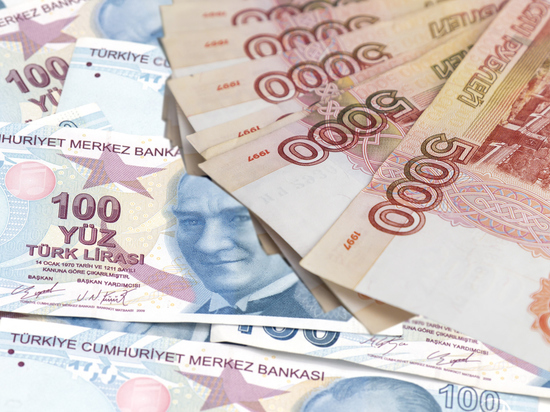Named the benefits of the new principles of trade between Russia and Turkey
[ad_1]

The main reason for the introduction of settlements in national currencies is the avoidance of “toxic” dollars
Moscow and Ankara will completely switch to trading in national currencies, excluding dollars and euros from circulation. According to the newspaper Milliyet, the process will begin with payments for Russian natural gas, which will be partially carried out in rubles. Which of the two sides is more beneficial?
“It is expected that trading in local currencies will provide protection for Turkey’s foreign exchange reserves,” this phrase from an article published in Milliyet clarifies a lot. As Nikita Maslennikov, a leading expert at the Center for Political Technologies, noted in an interview with MK, in July, annual inflation in Turkey exceeded 80%. Under the conditions of such price pressure, the country has a lot of problems with servicing both its external debt obligations and settlements in traditional reserve currencies (dollars and euros). The transition to trade with the Russian Federation in rubles and Turkish lira allows this pressure to be eased, and here and now.
So the motives of the Turkish side are generally clear. Time will tell how strategic, long-term they will become in the end. It is also clear, Maslennikov argues, that the central banks of both countries will have something to do: it is necessary to create a new payment and settlement infrastructure, to build correspondent relations between those banks of Turkey and the Russian Federation that service foreign trade turnover in a different way.
In 2021, the volume of bilateral trade amounted to $33 billion, an increase of 58.4% compared to 2020. Russia delivered $26.5 billion worth of goods to Turkey, and bought $6.5 billion worth of goods there. Thus, the positive trade balance reached $20 billion: such a bias in favor of the Russian Federation, as President Erdogan said, is largely provided by energy supplies. Indeed, the lion’s share (51.5%) in the structure of Russian exports to Turkey is occupied by oil and gas, followed by metals and products from them (23.4%), food products and agricultural raw materials (16.5%). Outsiders are products of the chemical industry (5.3%), precious metals and stones (1.2%), machinery and equipment (1.1%). But in the structure of imports from Turkey, machinery and equipment is in first place, with a share of 32.3%. Next come products and agricultural raw materials (28.4%), clothing and footwear (15.3%), chemical industry products (11.4%), metals (7%).
“For Russia, the transition to trade with Turkey in national currencies means the expansion of operations with the ruble. This reduces the risks in working with dollars and euros, whose toxicity is due to the freezing of the Central Bank’s gold and foreign exchange reserves, which has not gone away, Maslennikov says. – In the foreseeable future, other “friendly” countries, for example, BRICS participants, may join in similar schemes. True, everything depends on the specific interest of one or another partner of Russia: it can be different.”
Today, Moscow is actively making calculations of this kind in trade with Beijing and Delhi: yuan and rupees are used to pay for Russian energy resources. Earlier, the EAEU countries signed an agreement to increase the use of national currencies in mutual trade, reminds the head of the analytical department of AMarkets Artem Deev. Thus, Armenia, Belarus, Kazakhstan, Kyrgyzstan are gradually switching to these schemes. They can be joined by states that are observers or are members of the EAEU free trade zone: Uzbekistan, Vietnam, Singapore, Serbia.
“Which of the currencies will dominate in calculations is not as important as directly avoiding conversion in dollars, because the message is precisely in this,” notes Nikolai Pereslavsky, an employee of the Department of Economic and Financial Research at the CMS Institute. – It will not be possible to abandon the dollar and the euro in bilateral trade at once. Apparently, Ankara will pay for Russian products in rubles, while Moscow will pay for Turkish imports in lira. This alignment seems to be the most logical and fair.
But in order to ensure full-fledged mutual settlements in national currencies, it is necessary that the Russian payment system “Mir” work in Turkey at full capacity, so that the number of local banks, ATMs and terminals associated with it will expand. Then private trade will be greatly simplified, Pereslavsky believes. As for settlements in national currencies with other countries, de facto almost all Asian, African and Latin American states can switch to them.
“Based on the structure of trade turnover for 2022, it is clear that the ruble will dominate in settlements with Turkey,” says BitRiver financial analyst Vladislav Antonov. – I am glad that the parties intend to activate the acceptance of Mir cards by Turkish banks and their connection to the Russian analogue of SWIFT. In the first quarter alone, trade increased 2.1 times to $13.7 billion, and Putin and Erdogan want to bring it up to $100 billion.”
[ad_2]
Source link






